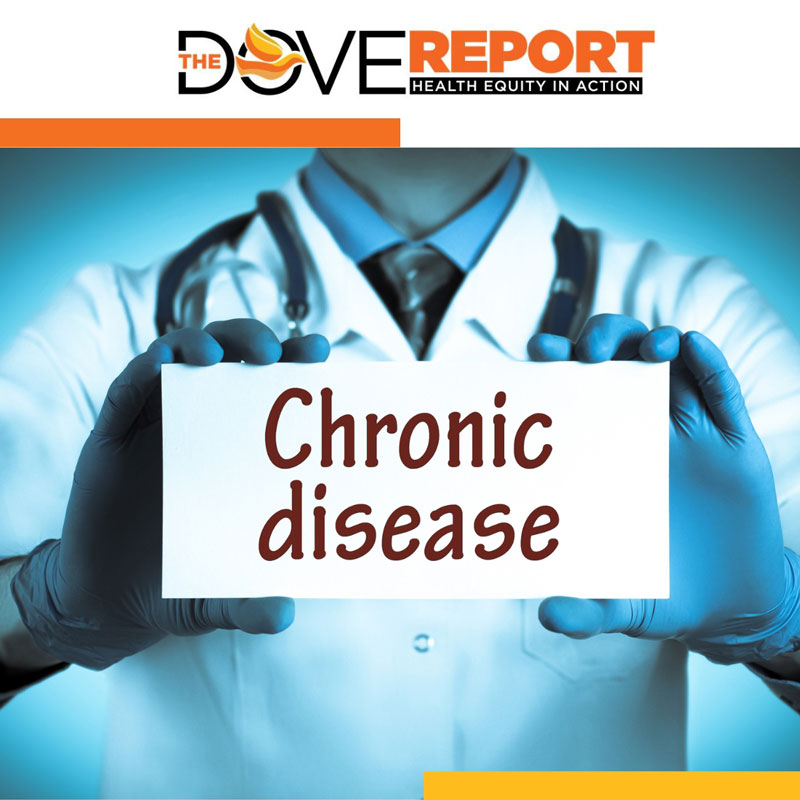HCDI Recognizes Chronic Disease Awareness Month
By HCDI Communications
July is chronic disease awareness month; chronic disease is a health condition lasting over a year that needs ongoing medical care or impacts daily activities.
 There are several types of chronic diseases, such as diabetes, stroke, Alzheimer’s, cancer, and heart disease. Over 6 in 10 adults in the US are living with chronic disease. Chronic diseases such as heart disease, cancer, and diabetes are the leading causes of death and disability in the United States. They are also leading drivers of the nation’s $4.5 trillion (about $14,000 per person in the US) in annual healthcare costs.
There are several types of chronic diseases, such as diabetes, stroke, Alzheimer’s, cancer, and heart disease. Over 6 in 10 adults in the US are living with chronic disease. Chronic diseases such as heart disease, cancer, and diabetes are the leading causes of death and disability in the United States. They are also leading drivers of the nation’s $4.5 trillion (about $14,000 per person in the US) in annual healthcare costs.
Risk factors
These are some of the risk factors of chronic disease:
- Excessive alcohol use can lead to alcohol use disorder, heart disease, liver disease, and certain cancers.
- Poor nutrition and physical inactivity are significant risk factors for obesity, type 2 diabetes, heart disease, stroke, and certain cancers.
- Cigarette smoking leads to cancer, heart disease, and lung diseases.
Chronic Disease Prevention
Ways to reduce the risk of chronic diseases:
- Know your family history and talk to your doctor about preventive measures.
- Getting enough sleep is crucial. Adults need at least 7 hours of sleep daily.
- Good oral health such as drinking fluoridated water, brushing, flossing, and seeing the dentist annually.
- Quitting smoking reduces the risk of serious health problems such as heart disease, cancer, type 2 diabetes, and lung disease.
- Eating healthily helps prevent, delay, and manage heart disease, type 2 diabetes, and other chronic diseases.
- Engaging in regular physical activity can help prevent, delay, or manage chronic diseases.
- Over time, excessive drinking can lead to high blood pressure, various cancers, heart disease, stroke, and liver disease.
- To prevent chronic diseases or detect them early, it is important to visit your doctor and dentist regularly for preventive services.
Healthy People 2030 Chronic Disease Objectives
| Objectives | Most Recent Data | Target | Baseline |
| Reduce the number of people diagnose with diabetes yearly. | 5.5 new cases of diabetes per 1,000 adults (2019-21) | 4.8 per 1,000 | 5.5 new cases of diabetes per 1,000 adults
within 2019-2021 |
| Reduce the rate of deaths from any cause in adults with diabetes. | 15.2 deaths per 1,000 person years (2010-15) | 13.7 per 1,000 | 15.2 deaths per 1,000 persons within 2010-2015 |
|
Increase the proportion of adults with diabetes who have a yearly eye exam.
|
Most Recent Data: 64.6 percent (2022) |
70.3 percent | 64.8 percent in 2019 |
|
Increase the proportion of people with diabetes who get formal diabetes education.
|
55.1 percent (2019) | 55.2 percent | 51.7 percent of adults in 2017 |
|
Increase the proportion of adults with diabetes using insulin who monitor their blood sugar daily.
|
86.5 percent (2019) | 94.4 percent | 89.0 percent in
2017 |
Healthy People 2030 aims to reduce diabetes cases, complications, and deaths. Over 30 million in the US have diabetes, the seventh leading cause of death. Certain racial/ethnic minorities are at higher risk, and many with diabetes are unaware.
What is Healthy People 2030
In 1979, the Healthy People initiative started with the “Healthy People: The Surgeon General’s Report on Health Promotion and Disease Prevention.” The mission of Healthy People 2030 is to improve the health and well-being of all people.
HCD International Engages in Diabetes Management and Educational Programs
The Diabetes Center of Excellence (DCOE) is an evidence-based program focused on improving healthcare outcomes for real people. Our mission is to enhance the well-being of underserved populations through holistic, culturally appropriate educational services across the diabetes care continuum.
Diabetes Self-Management Program
HCD International offers a six-week diabetes self-management education workshop using the Diabetes Empowerment Education Program (DEEP). Our program aims to teach self-monitoring, healthy lifestyle behaviors, self-care, decision-making skills, problem-solving, and collaboration with the healthcare team to improve clinical outcomes and overall quality of life.
Diabetes Prevention Program
The DPP helps individuals with pre-diabetes make healthier choices to delay or prevent type 2 diabetes. The program, led by a trained lifestyle coach, consists of 26 one-hour sessions over a year using a combination of distance learning and in-person classes.
To learn more about our Diabetic Center of Excellence Programs, visit www.hcdidcoe.com or contact us directly at DCOE@hcdi.com
Sources
https://www.cdc.gov/chronic-disease/index.html






